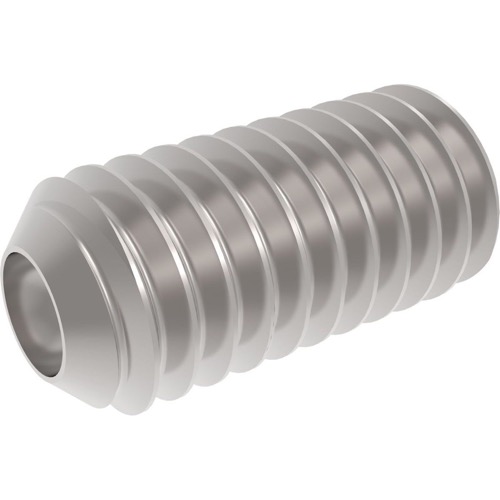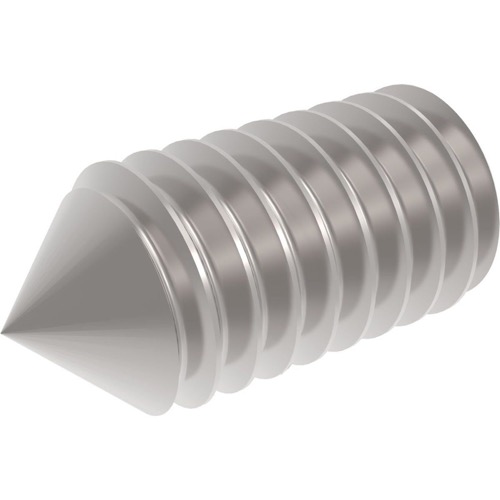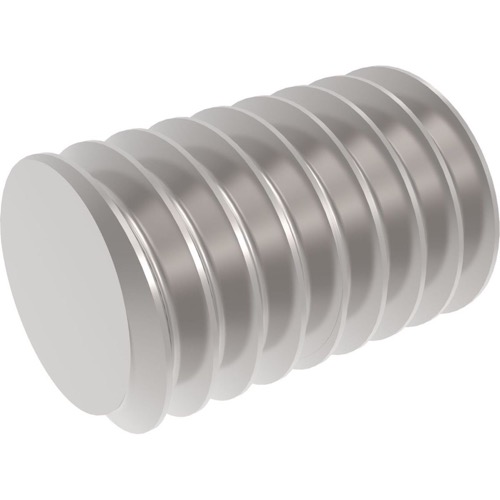Good high temperature oxidation resistance to 2000°F
High temperature stability for moderate strength applications
- Good oxidation and carburization resistant to 2000°F
- Resistance to moderate sulfidation and nitriding
- Economic alternative to high temperature nickel alloys
- 310SS chemistry & specifications
- Features & benefits of 310SS set screws
Designed for high temperature applications, 310 stainless steel set screws provide high temperature oxidation resistance to 2000°F under mild cyclic conditions. An economic alternative to nickel alloys like alloy 330 or Inconel, 310 set screws provide slightly less strength and temperature resistance – but at a significantly lower price point. Alloy 310 screws can be used in moderately caburizing, moderately oxidizing, nitriding, cementing and thermal cycling applications when not used at the maximum service temperature. 310SS set screws also have good resistance to sulfidation and other forms of hot corrosion. Although primarily known for its high temperature properties, 310 screws also provide excellent performance at cryogenic temperatures, with toughness down to -450F. Though 310 is ideal for high temperature use, it should not be exposed to the severe thermal shock of repeated liquid quenching or where aqueous corrosive contaminants are present.
Benefits
- High temperature resistance.
- Excellent resistance to oxidation under mildly cyclic conditions.
- Good resistance to sulfidation and atmospheres where sulfur dioxide gas is encountered at elevated temperatures.
- Good resistance to thermal fatigue.
- Excellent toughness to cryogenic temperatures of -450°F.
- Low magnetic permeability.
- Good ductility and weldability.
Applications
- Thermal processing and high temperature furnaces rely on 310 set screws for their high temperature and oxidation resistance in minor cyclic conditions.
- 310SS set screws are commonly used in the petrochemical industry for their ability to provide resistance to moderately carburizing atmospheres.
- The high temperature properties of 310 screws make them ideal for ore processing, steel plants, power generation, and sintering.
- Cryogenic structures often use 310SS set screws for their strength at -450°F and low magnetic permeability.
| 310 Stainless Steel Properties | |
| Tensile Strength (ksi) | 70 |
| Yield Strength (ksi) | 30 |
| Rockwell B Hardness | 95 |
| Density (lb/in3) | 0.285 |
| Electrical Resistivity (Microhm-in at 68°C) | 30.7 |
| Modulus of Elasticity (x 106 psi) | 28.5 |
| Thermal Conductivity at 212°F (BTU/hr/ft2/ft/°F) | 8.0 |
Resources: Flange Dimensions, Flange Bolting Chart
Alloy 310 Screw Types: 12 Point Screws, Button Head Cap Screws, Flat Head Screws, Hex Head Cap Screws, Pan Head Screws, Set Screws, Socket Head Cap Screws, Tamper Resistant Security Screws, Torx Screws, Vented Screws
310 Stainless Steel Chemistry & Specifications
310SS Specifications: AMS 5521, AMS 5651, ASME SA 240, ASME SA 312, ASME SA 479, ASTM A 240, ASTM A 276, ASTM A 276 Condition A, ASTM A 276 Condition S, ASTM A 312, ASTM A 479, EN 10095, UNS S31008, UNS S31009, Werkstoff 1.4845

310SS Set Screw Features & Benefits
310SS set screws are unique in that they have no screw head, meaning that they have no protruding part past the threaded shaft. They are thread only and are available with a socket or slotted driver insert at one end. Set screws are used to secure an object within or against another object. Typically they secure a rotating part such as a gear or shaft. 310 set screws are driven through a threaded hole in the rotating part until it is tight against the inner object, preventing from moving relative to the outer object. Set screws are available with various points depending on the application.

Cup Point
This is the most commonly used set screw and is identified by a cup-shaped indentation on one end. 310SS cup points are typically used for a quick, semi-permanent or permanent applications where it is acceptable to cut the cup point edge of the screw.
Cone Point
A cone point is easily identifiable by its sharp cone-shaped point – just like an ice cream cone. 310 cone point set screws deliver the strongest clamping force due to the deep penetration of the point. As a result they are used for permanent assembly.
 Flat Point
Flat Point
The cheapest and simplest of the set screw point styles, this screw has a flat surface on the bottom of the screw. This type is used when you need the ability to frequently change parts and require minimal shaft deformation.
